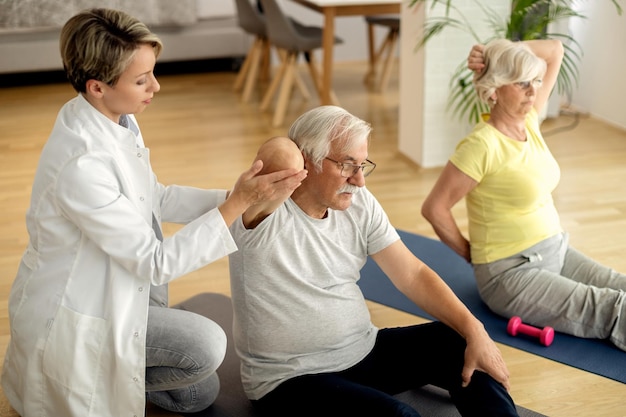
As people age, they’re more likely to experience pain and chronic conditions. Often, older patients find that their doctors struggle to manage their pain through medication alone. There are several obstacles to effective pain management with drugs, including tolerance to opiates, unusual pain symptoms, and the physical effects of aging.
Doctors frequently resort to opiates for adults with ongoing pain. However, using these drugs requires careful dosage adjustments, understanding withdrawal, and knowing how they interact with the body. If not prescribed correctly, opiates can do more harm than good.
Recognizing these issues, many healthcare providers prefer non-drug approaches to managing chronic pain when possible. They believe a holistic, interdisciplinary approach is better than just relying on medications.
Proper pain treatment in the elderly is crucial. Unmanaged pain can seriously affect their health and quality of life, potentially leading to depression, social isolation, anxiety, sleep problems, and even mobility issues.
Doctors face many challenges with pain management, such as insufficient training, hesitancy to prescribe opiates, and difficulties in assessing pain. Each patient responds differently to treatments, making it hard to find a one-size-fits-all solution.
Older adults react differently to medications compared to younger people. Non-drug methods can be beneficial and avoid the side effects of medications. As we age, our bodies process drugs less efficiently, leading to various problems and sensitivities.
While medications can be helpful for elderly patients, problems arise when they are the only option. Incorporating non-drug methods into treatment plans is important, especially for the elderly, due to the potentially severe side effects of medications.
Some effective non-drug treatments for managing pain in the elderly include:
Education
Understanding the source of pain can make it less bothersome. Patient education programs help seniors grasp the nature of their pain and provide tools to communicate better with their doctors, leading to better treatment outcomes. Educated seniors tend to use coping strategies over opiates, reducing the risks of addiction and medication side effects. Both individual and group programs are effective in managing pain.
Osteopathic Manipulative Therapy (OMT)
Stretching and massage therapy are valuable for those with chronic pain. OMT uses hands-on techniques to diagnose, prevent, and treat pain, incorporating stretching, gentle pressure, and resistance, which benefit elderly patients.
Spirituality
A spiritual approach can also help manage chronic pain. Religious individuals often experience less chronic fatigue or pain. Regardless of denomination, spirituality serves as a positive coping mechanism.
Hypnosis
Studies show that hypnosis can alter brain activity and reduce pain by targeting specific brain areas. Hypnosis can also decrease the unpleasantness of pain and speed up healing, allowing elderly patients to avoid medications and save money.
Music Therapy
Listening to music stimulates the brain, alters heartbeats, and adjusts breathing patterns, helping reduce pain and distract from problems. It also induces brain waves to sync with the music beat, with lasting effects even after the music stops. Slow music can help calm heart rate and breathing, easing tension and pain.
Aromatherapy
Using scents from flowers, herbs, oils, and extracts, aromatherapy helps seniors relax and alleviate pain. Scents can be inhaled during massages, baths, or other treatments, promoting relaxation and pain relief.
When treating chronic pain, opting for the least invasive, least toxic, and most effective therapies is key. It’s crucial to consider the patient’s preferences and dignity during pain treatment. Medications that impair daily functioning and happiness are not ideal. Maintaining personal connections is vital as people age, and reliance on opiates can lead to adverse effects like depression and anxiety.
Untreated chronic pain can be debilitating for many seniors, causing feelings of hopelessness and severely impacting their lives. Seniors should explore holistic treatments over addictive painkillers that offer only temporary relief. Healthcare professionals increasingly recognize that combining holistic methods with minimal opiate use often provides the best outcome for elderly patients with chronic pain.